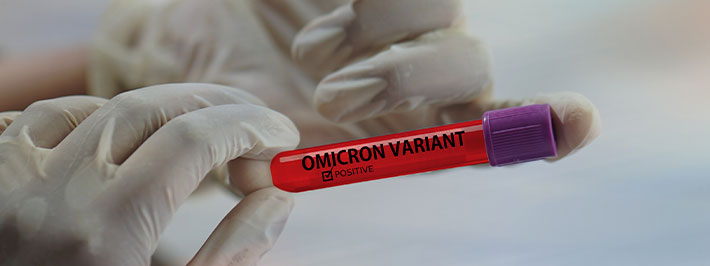
Covid-19: you can have Omicron twice in a short time
A new Danish study analyzed the Omicron BA.1 and BA.2 sublineages: it reveals that it is possible to be infected with one and then the other in a short period of time.
Several studies have already shown it: the risk of reinfection with the Omicron variant is higher than with the other variants. What is less known is that it is possible to get infected twice with Omicron in a short time. This is confirmed by a Danish study published on the scientific pre-publication site MedRxiv. Looking at the Omicron BA.1 and BA.2 sub-lineages reveals that it is possible to be infected by one and then the other in a short period of time.
The Omicron variant is divided into several sublineages: BA.1, which was the majority until then, BA.2 and BA.3. "The Omicron sequences identified in France still belong mainly to the BA.1 sublineage." But since January, the BA.2 sublineage has been gaining more and more importance in Europe: in countries like Denmark, it is already in the majority.
In their study, the researchers focused on the Omicron BA.1 and BA.2 sublineages. They started by analyzing data from 1.8 million people infected between November 22, 2021 and February 11, 2022 in Denmark. They then selected the 1,739 cases who received two positive tests more than 20 and less than 60 days apart, then 263 random samples.
Infection with BA.1 then BA.2: most affected unvaccinated youth
Result: of these 263 samples, 187 (71%) cases of reinfections were identified, of which 47 (18%) were contaminations by BA.1 and then BA.2. These reinfections have been observed mainly in young people under 30 years of age. All had mild symptoms, and reinfection did not result in hospitalization or death. Furthermore, most of them were unvaccinated, "underscoring the improvement in immunity elicited by the combination of vaccination and infection compared to immunity induced by infection alone," the study notes.
The researchers indicate that this is, to their knowledge, the first study related to cases of BA.2 reinfection and that it highlights a period between two contaminations as short as 20 days. For now, the European Center for Disease Prevention and Control speaks of reinfection when a person has two positive tests more than 60 days apart. "Given the short time between infections, it might be reasonable to re-evaluate the definition," the study says.
Another observation from the scientists: If the number of reinfections (187 cases) presented in the study seems low, "it does, however, underscore the need for continued assessment of the duration of vaccine-induced and/or natural immunity."